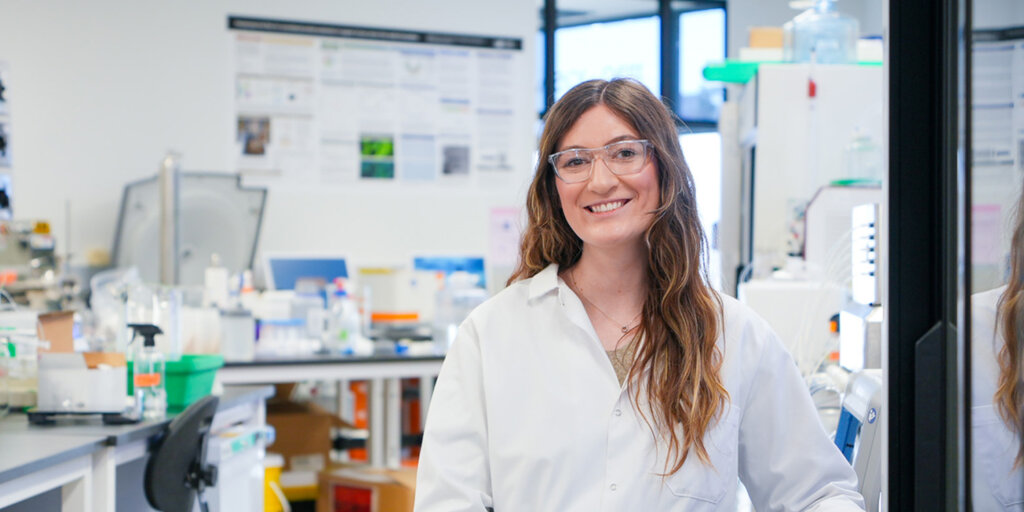Home » Inside the Canadian Lab Developing Ingredients for Next-Generation Medicines
Inside the Canadian Lab Developing Ingredients for Next-Generation Medicines

The future of biomanufacturing, particularly in vaccine development, lab-grown meat production, and medical research, is being significantly transformed by innovations in biotechnology, notably through the use of fruit flies. Edmonton-based startup Future Fields is pioneering this approach by utilizing the common fruit fly, Drosophila melanogaster, in producing essential proteins for various scientific applications. This method not only enhances efficiency but also promotes sustainability and cost-effectiveness in protein production.
The significance of the fruit fly in research spans over a century, with notable contributions, including six Nobel Prizes. Researchers have discovered that many genetic pathways in fruit flies closely resemble those in humans, providing vital insights into human biology. Laine Lysyk, the protein biochemistry lead at Future Fields, highlights the utility of fruit flies in generating recombinant proteins—proteins that are used extensively in medical research and therapies for conditions like cancer and diabetes.
Traditionally, recombinant proteins have been produced in bioreactors using bacteria, yeast, or mammalian cells. However, these methods are not only expensive but also less efficient in terms of resource usage. Future Fields aims to address these challenges by leveraging fruit flies, which require significantly less water and emit fewer carbon emissions compared to conventional methods.
Fruit flies are particularly adept at producing complex proteins that simpler organisms like E. coli cannot. This capability allows for advancements in medical research, especially in fields like organ regeneration and stem cell research, where high-quality proteins are critical. Future Fields focuses on providing the necessary resources for researchers tackling challenging scientific problems, thereby speeding up medical advancements.
In her role, Lysyk describes the intricate process of producing recombinant proteins, starting from cultivating flies or larvae, followed by utilizing high-tech equipment to extract and purify the proteins. This meticulous procedure ensures that the proteins meet stringent quality control measures before being prepared for distribution to scientists.
Lysyk’s journey into the field of biochemistry was inspired by early experiences in research, which solidified her interest in the molecular science of proteins. She credits her mentor, Joanne Lemieux, for fostering her confidence and encouraging her exploration within the scientific community.
Since joining Future Fields in 2020, Lysyk has been involved in developing proteins, including challenging membrane proteins that are crucial targets in drug development. By using cutting-edge recombinant technology, Future Fields aims to recruit and produce proteins that are structurally similar to their native counterparts, enhancing chances of success in drug screenings.
For aspiring protein scientists, Lysyk recommends seeking research opportunities at universities to build a strong foundation. Engaging with companies and researchers to learn about their projects can open doors to careers in the biotech industry.
Future Fields continues to innovate, with ongoing projects and a commitment to making biomanufacturing more sustainable and effective. By turning fruit flies into efficient biomanufacturing plants, they are leading a new wave of biotechnological advancements that could redefine the medical and food industries while contributing positively to the environment.
This visionary approach not only showcases the potential of insect-based biotechnology but also serves as a compelling example of how innovations can meet the growing demands of an evolving scientific landscape.
MaRS Discovery District
https://www.marsdd.com/
MaRS is the world's largest urban innovation hub in Toronto that supports startups in the health, cleantech, fintech, and enterprise sectors. When MaRS opened in 2005 this concept of urban innovation was an untested theory. Today, it’s reshaping cities around the world. MaRS has been at the forefront of a wave of change that extends from Melbourne to Amsterdam and runs through San Francisco, London, Medellín, Los Angeles, Paris and New York. These global cities are now striving to create what we have in Toronto: a dense innovation district that co-locates universities, startups, corporates and investors. In this increasingly competitive landscape, scale matters more than ever – the best talent is attracted to the brightest innovation hotspots.


